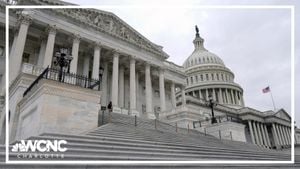Stepping onto the global stage, COP29 (the Conference of the Parties) is engaging world leaders and diplomats to confront one of the most dire issues facing humanity: climate change. The conference kicked off with high expectations. Delegates from around the world gathered under the banner of the United Nations Framework Convention on Climate Change (UNFCCC) in Baku, Azerbaijan, with hopes of substantial progress on climate financing and adaptation strategies. 2024's gathering, often dubbed the "Finance COP," marks a turning point where the dialogue pivots toward not only funding mechanisms but also social equity and justice as key components of climate action. With the impacts of climate change already apparent, the urgency for concrete solutions has never been more pressing.
During the COP29 discussions, the spotlight has gravitated toward the financial frameworks necessary to support developing nations grappling with climate adaptation and mitigation. Yet, as important as it is to scale up funding, equally significant is how these funds are shaped, managed, and distributed. Transparency, accountability, and equitable access were recurrent themes emphasized by numerous speakers through the sessions.
UN Secretary-General António Guterres made headlines by alerting G20 nations at the recent summit to the severity of the climate crisis. With over 80% of global emissions stemming from G20 countries, Guterres stated, "Our climate is at a breaking point. Unless we limit global temperature rise to 1.5 degrees Celsius, spiraling disasters will devastate every economy." His message was clear: urgent action is no longer optional – it’s necessary.
Among the developments reported from Baku, the anticipated discussion around the Global Goal for Climate Financing emerged as central. Historically, developed nations pledged to channel $100 billion annually to aid developing countries, but these discussions are shifting to reevaluate what’s needed now when many estimates highlight requirements surpassing $1 trillion. Yaschlin Rafiyev, COP29's chief negotiator, expressed the weight of expectations resting upon the conference: "There are interlinkages of the elements. That’s why having one of them agreed could unblock negotiations on others. The financial commitment is the first domino we need to fall to accelerate progress on other issues."
With nations effectively competing for funding, delegates fought through three principal components: how much financing will actually be available, the ratio of grants versus loans, and who will shoulder the financial responsibility. There are growing concerns from developing nations - they fear they’ll receive inadequate funding, potentially leading to more debt instead of empowerment. India’s junior environment minister echoed this worry, stating, "The global South is bearing the financial burden severely limiting our capacity to meet developmental needs."
The approach to delivering climate finance also remains under intense scrutiny. Experts have indicated the requirement for common ground—transforming pledges of financial aid not just from promises on paper but actionable commitments. Discussions surrounding leverage play critically here, as this mechanism lets donor countries amplify their contributions through partnerships with international financial institutions.
Delegation representatives like Michai Robertson from the Alliance of Small Island States argued for ensuring grants and manageable loans to avoid deepening debts for nations already economically strained. The triad of funding through grants, low-interest loans, and private sector investment has become the crux of negotiations. Building resilience on existing economic cycles needs innovative policies to attract private investments—accompanied by stringent regulations to secure environmentally sound practices.
Yet, financing for adaptation efforts might require more than financial tools. Adaptation means reassessing strategies to account for geographical vulnerabilities, integrating local knowledge within broader frameworks, and ensuring community engagement. Social justice must not be left off the agenda; addressing climate change's disproportionate burden on marginalized communities is being highlighted as the arena for collective progress. Therefore, adaptation strategies must engage diverse societal stakeholders and lift the voices of those most affected by climate change.
At the heart of these discussions lies the intersecting themes of finance and social equity. COP29 isn’t merely about securing cash for climate mitigation strategies or research funding; it emphasizes holistic approaches to solve socioeconomic issues intertwined with climate crises.
On another front, G20 leaders have urged rapid action to adapt existing financial architectures to meet these commitments. Jasper Inventor, Head of the COP29 Greenpeace Delegation, framed the challenge wisely: "The finance goal to be agreed at COP29 needs to significantly scale up public finance; it’s time for the polluting fossil fuel industry to pay up." Inventor voiced optimism about the declaration from G20 leaders, affirming their commitment to climate finance and urging swift translation of this positive momentum toward actionable commitments at COP29.
Throughout the sessions, the discussions began to reveal cracks as numerous parties expressed skepticism about whether developed nations do enough to commit to concrete finance packages. European nations have been roped under scrutiny for underplaying the contributions expected from fossil fuel giants toward combating climate disruption and adapting to its effects.
Innovatively, advocates are pushing for using financial taxation as part of the solution. Addressing growing wealth inequality, many argue it is time to design systems to collect revenues from the wealthiest to support climate adaptation efforts, thereby applying pressure on those who have benefited the most under the current financial models.
The discussions surrounding COP29 also echo the broader trends seen at earlier climate negotiations where significant resistance often leads to sluggish progress. Each subsequent session builds upon the lessons learned, but as history has shown, responding proactively is integral to fostering genuine engagements. During the recent G20 summit, Guterres reiterated for global partners to target the overhaul of the global financial architecture as instrumental to establish equitable international cooperation. He mentioned, "The world looks to you to act on the Pact’s commitments to accelerate reform."
The momentum gained from Baku will be pivotal for upcoming discussions, and as COP29 continues, the onus will likely rest on these fruitful dialogues translating not merely words but taking form as tangible commitments. It’s not simply about the money thrown at problems—it’s about ensuring equity and sustainability at every stage aligned with local realities.
Looking to the future, Baku could serve as the fertile ground for planting reforms and rallying collective will across nations to adapt and mitigate climate risk. Stay tuned as the world holds its breath for developments coming out of this significant climate conference.



